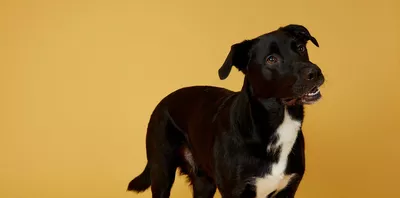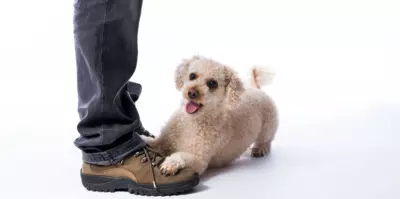Why Do Dogs Eat Grass?
- 27 Mar 2023
- 4m read

While it may seem strange, many dogs enjoy munching on grass, whether it's the fresh blades in your backyard or the long strands on your walks.
As a pooch owner, you may wonder why your dog is eating grass and if it's safe for them to do so. It’s important to be mindful of the potential reasons behind why they might be eating grass, as well as the risks that could be involved.
Why Does My Dog Eat Grass on Walks?
There can be a number of reasons why your dog might be running for the luscious, long blades of grass whilst you’re out on walk. It could be harmless greed, but it could also be a sign of something bigger.
Digestive aid
One of the most common explanations for why dogs eat grass is to aid their digestion. Grass is high in fibre, which can help move food through the digestive system and stimulate bowel movements. Eating grass can also cause your dog to vomit, which may help expel any indigestible material in their stomach, such as hair or bones.
Nutritional deficiency
Some experts suggest that dogs may eat grass if they have a nutritional deficiency in their diet. For example, if your dog isn't getting enough fibre or other essential nutrients, they may seek them out in the grass. However, this theory is debated, as many dogs who eat grass are on a balanced and complete diet.
Boredom or anxiety
Dogs may also eat grass simply out of boredom or anxiety. If your dog is cooped up in the house all day, they may look for ways to entertain themselves, such as munching on grass. Similarly, if your dog is anxious or stressed, eating grass may be a way to alleviate those feelings.
Natural instinct
Finally, some experts suggest that dogs may eat grass simply because it's a natural instinct. In the wild, dogs are known to forage for food, and grass may be part of their diet. While domesticated dogs have a steady supply of food, they may still be hardwired to seek out and eat grass.
Is Grass Good for Dogs?
You should be mindful of some risks for dogs that can come with eating grass. Whilst it's harmless the majority of the time, we would recommend discouraging your dog from eating grass altogether to minimise any possible risks to their wellbeing, such as:
Pesticides and herbicides
If you have a lawn that's been treated with pesticides or herbicides, your dog may be exposed to harmful chemicals when they eat grass. These chemicals can cause a range of health issues, such as digestive problems, respiratory issues, and even cancer.
Choking hazard
Eating grass can also be a choking hazard for dogs, particularly if they don't chew it thoroughly. Large clumps of grass can get stuck in your dog's throat, leading to choking and other respiratory problems.
Parasites and bacteria
Grass can also harbour parasites and bacteria that can make your dog sick. For example, if your dog eats grass that's been contaminated with faeces, they may contract an infection or parasite, such as roundworm or giardia.
Grass Allergy in Dogs
If your dog eats grass, you might be worrying that they could have a bad reaction. It is possible that dogs can show allergy symptoms after eating grass, such as itching, swelling, and respiratory problems. It is very rare that dogs will have a severe reaction to eating grass, but you should keep an eye on their behaviour.
What Should I Do If My Dog Eats Grass?
If your dog eats grass, it's important to monitor their behaviour closely. They might not have any reaction to it, but it’s better to be safe and keep an eye on them.
Supervise your dog
Whenever you're outside with your dog, keep an eye on them to make sure they're not eating anything they shouldn't. If your dog starts to graze on grass, redirect their attention to a toy or other activity.
Check your garden
If you have a garden, make sure that it hasn't been treated with pesticides or herbicides. These can be toxic if ingested by your dog. If it has, keep your dog away from those areas and consider using pet-safe alternatives instead.
Provide a balanced diet
Make sure your dog is getting a balanced and complete diet with all the essential nutrients they need. If you're concerned that your dog is eating grass because of a nutritional deficiency, talk to your vet about adjusting their diet.
Eating grass is a common behaviour among pooches. This can happen whilst you’re out on walks or even in your very own garden. Dogs may eat grass for a variety of reasons.
However, there are also potential health impacts to consider, such as exposure to harmful chemicals, choking hazards, and the risk of contracting parasites or bacteria. If you’re concerned about your dog’s health and wellbeing, be sure to reach out to your vet.




.png)